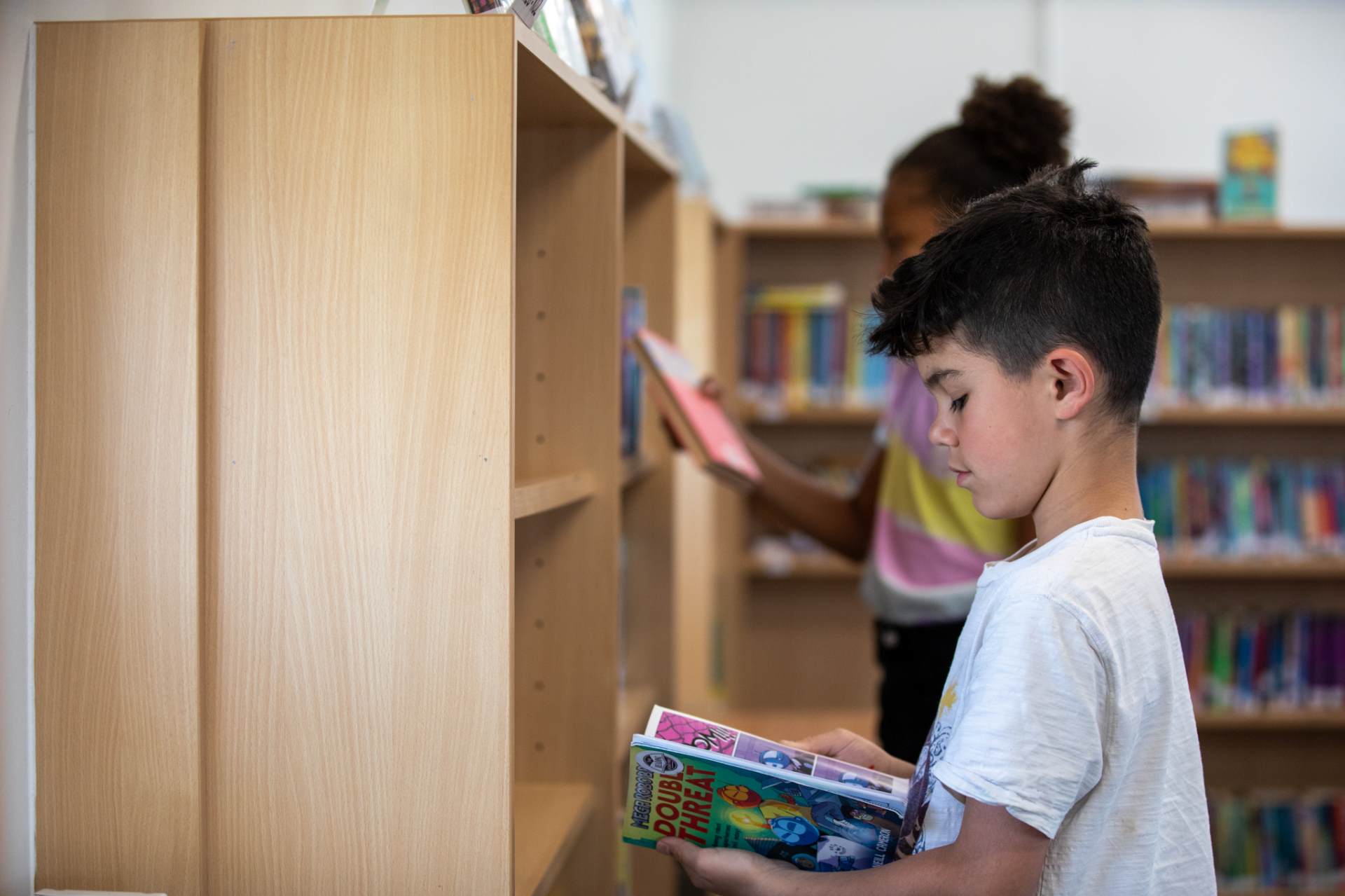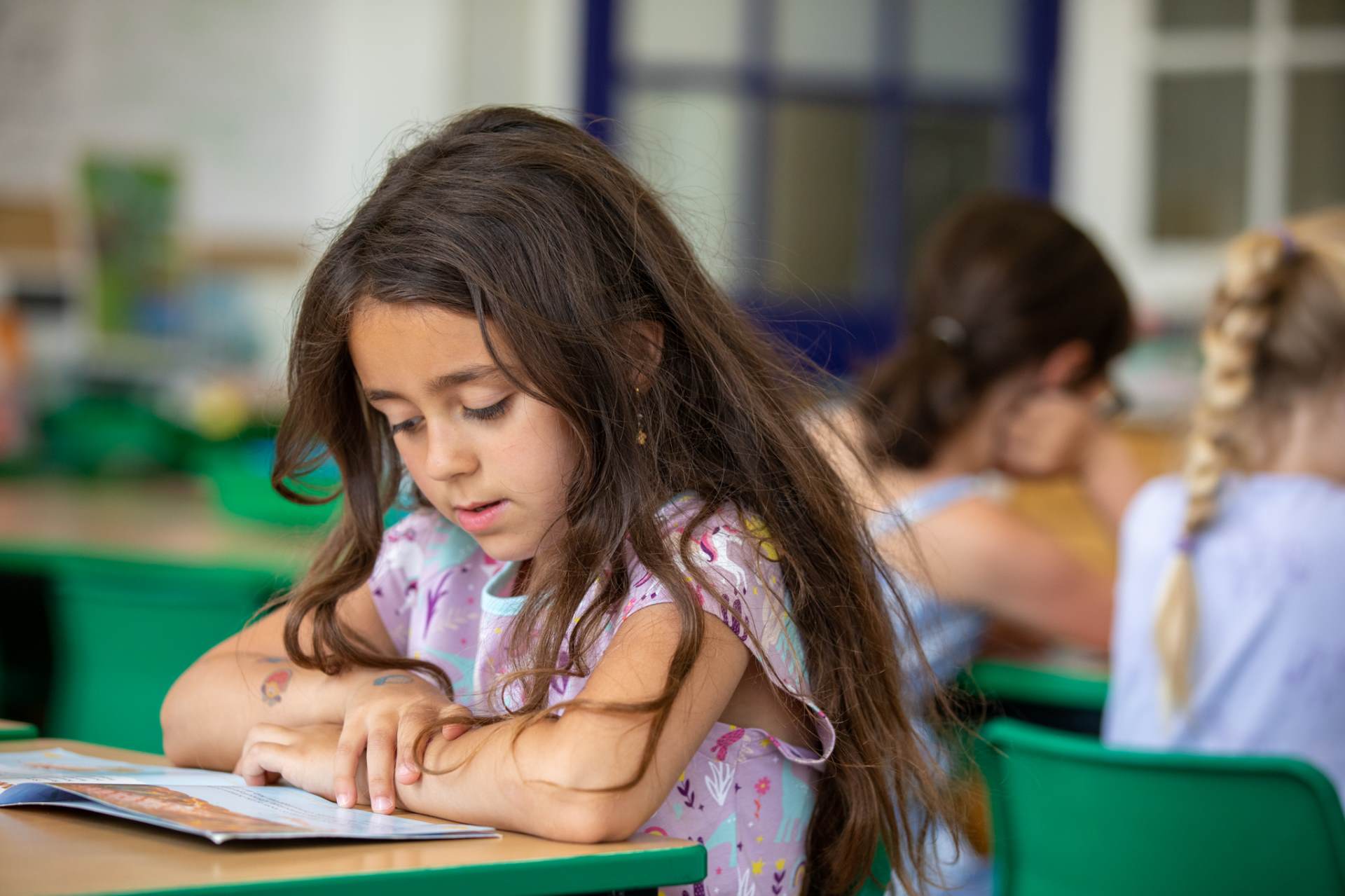English - reading
English is at the heart of our curriculum, as it is through our use of English that we communicate and connect.
Click here to read about how we approach our curriculum, and to download our progression maps.
Spoken language, stories and written texts lie at the centre of our culture, helping us to understand and influence the world around us.
Reading and writing ‘float on a sea of talk’: we place great emphasis on developing confident, articulate speakers who can listen to and understand others. Developing a wide vocabulary is a key element of this. When we plan our teaching we are conscious of the new words, phrases and concepts that children need in order to really understand a new topic, and be able to explain their learning. Our lessons in all subjects are designed to support children’s speaking and listening skills by including opportunities for discussion, debate, explanation and presentation to an audience.
Our planning ensures that we cover all the elements of the National Curriculum for English.
Intent
At Hanover, we are passionate about developing a love of reading. Reading is the foundation for motivated and independent learners. We approach reading in a wide range of ways, in order to ensure that no child misses out on the pleasure of books.
We strive for our children to be:
- Fluent readers who can draw meaning from texts
- Passionate about reading a range of different text types
- Intrigued and inspired by stories about people and the world
- Informed by texts, both in school and in their home reading
- Confident when talking about what they have read
We aim for all of our children to develop the skills and drive to be life-long readers who enjoy reading for pleasure, to learn more about the world, and to connect and empathise with characters and their different experiences.
Implementation
Every class benefits from a curriculum centred on high-quality texts. Not only do we use these texts to teach the different reading skills, we also use them to understand others’ points of view, to expand horizons, and to be a shared experience for the class to discuss. Where possible, these texts are linked to the term’s wider curriculum learning.
For children in Reception and Key Stage 1, reading sessions with the teacher focus on practising early reading skills and comprehension of carefully chosen texts. This is supplemented by small group, shared and modelled reading, where the teacher demonstrates key strategies and explains their thinking about vocabulary, author’s intent, and the purpose and meaning of the texts.
In Key Stage 2, children have a daily whole-class reading lesson, focusing on skills such as retrieval of information, summarising, expanding vocabulary, and explaining their understanding of the text. Additional support with reading is provided for those children who need it and children will either read 1:1 with a trained teaching assistant, or in a small focus group, in order to improve their phonics, decoding and comprehension skills. We also work with Coram Beanstalk, whose reading volunteers work with different groups of children throughout the year, with the aim of encouraging and fostering a love of reading. Teachers read aloud to their classes every day, ensuring a wide range of authors and texts are experienced and enjoyed during pupils’ time at Hanover.
We have a brilliant school library, which stocks a diverse selection of fiction and non-fiction books that will appeal to children’s wide-ranging interests, passions and hobbies. Each class spends a session in the library every week so that they can enjoy discovering, sharing and reading new books. We encourage children to take a book out each week from the library so that they can read it at home. Every class has a well-stocked book corner, and has timetabled periods of independent quiet reading.
Children with SEND, and others who need more support with reading, may benefit from additional phonics to support decoding, and extra reading sessions 1:1 with an adult to help with comprehension and enjoyment. Reading progress is monitored regularly and additional support swiftly provided when needed.
Impact
Children will enjoy reading, have experienced a wide range of books and developed preferences for particular genres and authors. They will have the skills needed to comprehend a wide range of texts, and be able to discuss, compare and recommend books to one another.
Reading at home
We want to foster a love of reading which will follow children throughout their lives, to enable them to write creatively, accurately and efficiently. We wish for our children to develop a love of language and for them to possess the tools they will require as they move through the school and onwards in their lives. Reading with your child at home makes a huge difference to their achievement. We made the following film to help parents read more effectively with their children. Please do watch it and try some of the tips.
English - phonics
Intent
Phonics is an important tool to decode written text. It is a way of teaching reading that focuses on the sounds in different words, and then on linking those sounds to individual or groups of letters which represent those sounds (this is called ‘grapheme-phoneme correspondence’ or GPCs).
We aim that children quickly become familiar with GPCs so they can decode printed text, start to comprehend it, and gain confidence in themselves as readers.
Implementation
The phonics scheme we use at Hanover is ‘Success for All’, a synthetic phonics program which builds up children’s recognition of letters and sounds steadily, securing the new knowledge with decodable reading books designed so pupils can immediately practise their new learning.
We start with teaching awareness of sounds and print in Nursery, where children develop ‘phonemic awareness’ through listening activities, games, singing and reciting nursery rhymes. Children need to be able to hear individual sounds before they are introduced to written letters. This stage is very important, and underpins the structured phonics teaching which begins in Reception.
Pupils in Reception and Key Stage 1 have daily phonics lessons, which revise prior learning, introduce new GPCs, and practise reading and writing words using them. Children are also taught to read and write ‘red words’ - those words which are not phonically decodable and need to be learnt by sight.
Teachers model the application of phonics learning when reading shared texts to the children. Alongside this, teachers use ‘think alouds’ to ensure comprehension, explore ideas, and expand children’s vocabulary.
Phonics progress is monitored regularly and additional support swiftly provided when needed. Children with SEND, and others who need more support with decoding using phonics, benefit from an additional program called ‘Lightning Squad’, part of our phonics scheme, which provides carefully-tailored small-steps practice and reinforcement.
Impact
Children’s phonics learning means they quickly gain confidence to attempt unfamiliar words, and learn to decode fluently. This enables them to build their comprehension and enjoyment of what they’re reading. Understanding phonics also supports children to write words accurately; learning the different ways sounds are represented in English is a key element of the later spelling-focused phases of the Success for All scheme.

